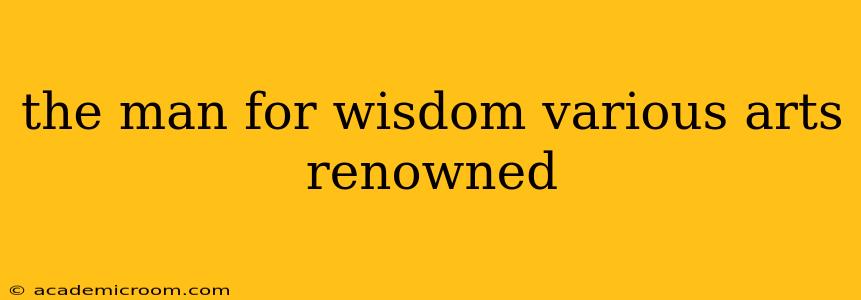The Man for Wisdom: Exploring the Allure of Polymathy
The phrase "the man for wisdom, various arts renowned" evokes an image of a Renaissance ideal: a figure of immense intellect, skilled in numerous disciplines and deeply knowledgeable across a broad spectrum of human endeavor. This archetype, far from being a relic of the past, continues to fascinate and inspire us. But what exactly constitutes this multifaceted individual, and what are the advantages and challenges of pursuing such widespread expertise? Let's delve into the multifaceted nature of this compelling figure.
What defines "a man for wisdom, various arts renowned"?
This description speaks to the concept of a polymath. A polymath isn't simply someone who knows a lot; they possess a deep understanding across diverse fields, often demonstrating the ability to connect seemingly disparate areas of knowledge in innovative and insightful ways. Leonardo da Vinci, perhaps the quintessential example, mastered painting, sculpture, architecture, science, engineering, and anatomy, leaving behind a legacy that continues to astound and inspire. However, polymathy isn't solely about accumulating knowledge; it's about the application and integration of that knowledge, fostering creativity and problem-solving skills that transcend disciplinary boundaries.
What are the benefits of being a polymath?
The advantages of cultivating diverse expertise are numerous:
- Enhanced problem-solving: Polymaths possess a broader toolkit to tackle complex challenges. Their ability to draw upon knowledge from different fields allows for creative and unconventional solutions.
- Increased creativity and innovation: The intersection of diverse knowledge domains fosters unexpected insights and innovations. Connections between seemingly unrelated concepts can spark breakthroughs.
- Improved communication and collaboration: Polymaths often excel at bridging communication gaps between specialists in different fields, facilitating effective collaboration.
- Greater adaptability and resilience: In a rapidly changing world, individuals with a diverse skillset are better equipped to adapt to new challenges and opportunities.
Is it possible to become a polymath in the modern era?
Can anyone become a polymath? While mastering multiple fields to the level of a Leonardo da Vinci might be exceptionally rare, the principles of polymathy are attainable. The key lies in cultivating intellectual curiosity, a willingness to learn continuously, and a proactive approach to connecting seemingly disparate areas of knowledge. The modern era, with its readily accessible information and diverse learning opportunities, even facilitates this pursuit more than ever before.
What are the challenges of being a polymath?
The path of the polymath isn't without its difficulties:
- Time management: Mastering multiple disciplines requires significant time and effort. Balancing different pursuits demands exceptional organizational skills.
- Depth vs. breadth: The pursuit of breadth can sometimes come at the expense of depth. Finding the balance between exploring various fields and achieving mastery in specific areas is crucial.
- Maintaining focus: The sheer breadth of knowledge can be overwhelming. Maintaining focus and prioritizing goals is essential to avoid feeling scattered.
How can I cultivate polymathic tendencies?
Developing a polymathic mindset is a journey, not a destination. Here are some steps to embark on this enriching path:
- Embrace lifelong learning: Cultivate a persistent curiosity and actively seek out new knowledge and experiences.
- Connect disparate fields: Actively look for connections between different areas of study and explore how concepts from one field might illuminate another.
- Develop strong foundational skills: A solid foundation in core subjects provides a robust framework for building expertise in other areas.
- Practice interdisciplinary thinking: Challenge yourself to approach problems from multiple perspectives, drawing upon your diverse knowledge base.
In conclusion, "the man for wisdom, various arts renowned" remains an inspiring ideal, a testament to the boundless potential of the human mind. While achieving the level of mastery demonstrated by historical polymaths may be a challenging goal, embracing the principles of intellectual curiosity, lifelong learning, and interdisciplinary thinking can unlock significant personal and professional growth. The journey towards becoming a more well-rounded, adaptable, and creative individual is a worthwhile pursuit in today's dynamic world.
